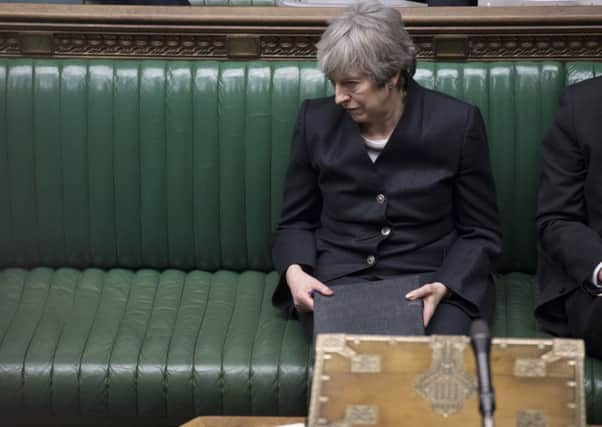How Project Fear has affected the political class over Brexit – Yorkshire Post letters


BILL Carmichael hits the nail on the head twice over when he writes (The Yorkshire Post, April 12) that ‘our political class [including the civil servants who advise the politicians] ... say leaving is too difficult’.
Advertisement
Hide AdAdvertisement
Hide AdThey contend that a total exit from the EU would lead to excessive difficulties for us all, but the fact is that it would be also be too difficult for the politicians and civil servants to work out what to do.
My daughter, who has long experience of working in business finance in London and New York, finds that the difference between the two is that whereas in New York the approach to a new task is to seek the best way to tackle the situation, in London the approach is to ask what was done in similar cases in the past.
The London-based civil servants have so long been following precedent that they have lost the intellectual keenness with which they once entered the profession after the Oxbridge first class degrees with which many of them began.
No wonder that they have consistently backed Remain – by remaining in the EU they know what to do by following existing practice, without the need to apply their atrophied minds to think constructively about a situation which they fear would be difficult for them to adjust to.
Advertisement
Hide AdAdvertisement
Hide AdProject Fear thus has two meanings too – the intended fear instilled in the public, and the mandarins’ own fear of having to create new methods.
From: Keith Punshon, Willow Bridge Lane, Dalton, Thirsk.
POLITICIANS are using every trick in the book to ignore voters. Remember David Cameron’s fair-voting legislation, so that every person’s vote carries equal weight? With some constituencies numbering 40,000 voters to the Isle of Wight’s 110,000, it was clear years ago that some voters were more equal than others. Nothing has changed.
Remainer MPs are relying on another referendum to save their skins. On the one hand they represent their constituents’ views by overruling them, as they know better. On the other hand, they now want a referendum so that voters cannot deliver their judgement on the allegiance of their MP to manifesto promises in a general election. They are saving their own skins.
The Remainers are banking on Brenda of Bristol whose response to the 2017 election “You’re joking...what...another one?” will get them off the hook. The likes of Anna Soubry MP are hoping folk are so fed up with politicians, and ignored results, that only Remainer voters will turn up when many working class folk realise that their votes are worthless.
Advertisement
Hide AdAdvertisement
Hide AdAnd the question we will face in a new referendum? To remain shackled to the EU with Mrs May’s deal watered down by Labour, or Remain? They will ensure leaving the EU is not on the ballot.
They didn’t like the result last time. Power belongs to political parties and the Establishment, and don’t they know it?
From: Michael Meadowcroft, Former Liberal MP for Leeds West.
THERE are key errors in the recent pre-election statement of the Cabinet Officer Minister, Chloe Smith, which defends the introduction of the requirement to produce ID evidence before voting in a number of areas next month (The Yorkshire Post, April 11).
Advertisement
Hide AdAdvertisement
Hide AdIt is incorrect to state that the present voting procedure “is an identity check from the 19th century, based on the assumption that everybody in the community knows each other”.
In fact, it was based on the very different assumption that the candidates and parties were sufficiently well organised and entrenched in their communities to enable them to know their patch. The safeguard against impersonation was the provision for each candidate to appoint polling agents to stand within the polling station equipped with the electoral register and having the authority to challenge any apparently fake voter.
That provision still exists but is rarely used today. A further safeguard is that the marked register, showing who voted – but not, of course, how they voted – is available for a time after the election so that it can be checked as to whether any deceased or absent electors actually voted.
Finally, if a registered elector goes to the polling station and is denied their vote, including if they have already been crossed off as having already voted, they can still vote with a coloured “tendered” ballot which is kept separate and only included if it would affect the result. My granddaughter used this provision at last May’s election.
Advertisement
Hide AdAdvertisement
Hide AdOur 19th century forebears did, in fact, go to extreme lengths to ensure the security of the ballot. By contrast substituting individual for household registration, and demanding ID evidence, whilst apparently logical, actually reduces the number of electors able to exercise their democratic rights.
If the Government really wishes to make the ballot more secure, then it should abolish postal votes, as the French did in 1974, and replace them with the greater availability of proxy voting and with the mobile ballot box, as used in a number of new democracies. Once the ballot paper is outside the polling station, it is not secure.
Hypocrisy in racism fight
From: George Marsden, Pledwick Lane, Wakefield.
BRADFORD MP Imran Hussain wans to eradicate racism (The Yorkshire Post, April 11). So why does he sit alongside Parliamentary colleagues, and in a party, which refuses to denounce the disgusting anti-Semitic stance of some of its membership?
From: Andrew Mercer, Guiseley.
THE confidence of footballers like Raheem Sterling and Danny Rose to confront racism is doing far more good than statements by our mealy-mouthed politicians. Do others agree?